Mikhail Tal - The Magician from Riga

Mikhail Tal
Tal had a completely different approach. He continually sought to confuse the issue. He had an incredible ability to judge a complicated tactical thrust without necessarily working out the precise variation in advance. He trusted his instincts on the outworking of a sacrifice. If he liked his chances or if the possibility held intrigue, he invariably went for it.
His opponents, the strongest of grandmasters themselves, would time and time again, succumb to his tactical storms. No one liked getting in a tactical dual with Tal. So when he initiated one, his opponent would immediately be psychologically on the ropes.
Young Mikhail

Young Mikhail
Tal did not allow this to hold him back. He learned to read aged 3 and by 15 was studying for university. Chess came to his attention when he saw his father, a doctor, playing a game in his clinic.
Tal was greatly taken with the game and not long after joined the Riga Palace of Young Pioneers. His chess was unremarkable at first and he had to work hard on it. Four time Latvian Champion and IM Alexander Koblents tutored Tal from the age of 13 and his game rapidly improved.
Quick Success
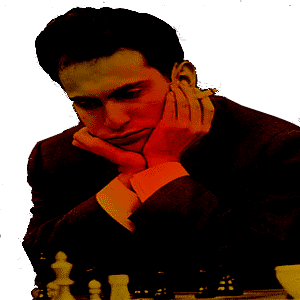
Mikhail Tal was rarely seen without a cigarette in his hand
Tal won a qualifying match against Vladimir Saigin in Riga in 1954. He gained the title of Soviet Master with this win. When he won a game against GM Yuri Averbakh later that year it was confirmation that he had the ability to go far.
His studies were also going well and he graduated from university and began to teach in Riga. This would provide him with a living as he pushed on with his quest for glory in chess.
Soviet Champion

Mikhail Tal won his first Soviet Championship at 20 and World Championship at 23
He was still only 20 years old. He had not competed in many international tournaments. This would usually have meant that he could not be considered for the title of Grandmaster. But since the Soviet Championship was the strongest tournament in the world FIDE made an exception. Tal was made a GM.
He justified the decision by retaining his title the following year. The USSR Championship would become one of the great highlights of Tal's career. He would go on to win it 6 times in all, a record shared only by Botvinnik.
Interzonal and Candidate Triumphs

Mikhail Tal successfully negotiated his way through the Interzonal and Candidate Tournaments in 1958 and 1959
His USSR title gave him automatic inclusion in the 1958 Interzonal Tournament at Portoroz, Slovenia. He won the tournament to qualify for the final stepping stone towards Botvinnik. Next he was on the victorious Soviet team at the Chess Olympiad in Munich. This was followed by a great victory over a strong field in Zurich, Switzerland early in 1959.
Tal was in good form heading into the 1959 Candidate's Tournament held in Bled, Zagreb and Belgrade in the former Yugoslavia. He made it count by winning it ahead of Keres, Petrosian and Smyslov. Gligoric, Fischer, Olafsson and Benko were out of contention by some way. Interestingly, Tal lost his personal dual with Keres 3-1 but great results against the weaker players (including a 4-0 demolition of a young Bobby Fischer) saw him prevail.
Botvinnik vs Tal

Mikhail Tal won the World Championship in 1960
Mikhail Tal, the young upstart from Riga, was blazing a new trail for chess. He was laying waste to all of the strongest GMs around. His style was a throwback to the glory days of Anderssen, Zukertort and the great artists of that period. He was playing audacious sacrifices and winning in breath taking style. Even the strongest masters could not solve his riddles over the board.
Mikhail Tal had quickly become a hero for most chess fans. Crowds thronged both inside and outside the Pushkin Theater in Moscow for this hotly anticipated contest. Some said that Tal's tricks would not work against the mighty Botvinnik. Others said that his march to the title was unstoppable.
As it turned out Botvinnik couldn't survive the tactical battles that Tal pulled him into. The Magician from Riga stormed to victory winning 6-2 (15 draws). Aged just 23, Mikhail Tal was the youngest ever World Champion.
Return Leg
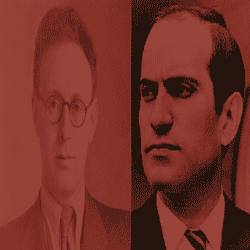
Mikhail Botvinnik won the rematch against Mikhail Tal
Botvinnik even said, much later, that if Tal would train, program himself, and put himself on a strict regimen,"He would be impossible to play against." Botvinnik analyzed the games meticulously and found that he had lost because he had allowed Tal to engage him in tactical duals.
Botvinnik trained hard and activated his rematch clause to play Tal in 1961. He made sure that the games had a more positional feel this time. It worked because Botvinnik regained the World Championship winning 10-5 (6 draws).
Tal in the 60s and 70s
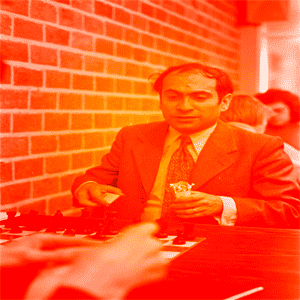
The 60s and 70s saw Mikhail Tal at his best
Tal won the 1964 Interzonal Tournament in Amsterdam for the following cycle. He beat Portisch in the Quarter-final and Larsen in the Semi-final of the 1965 Candidates Tournament in Bled. Boris Spassky would however have too much for him in the Final in Tblisi.
As it would turn out, Tal would never again reach a World Championship decider but he would remain a serious player on the Tournament circuit. He won Palma de Mallorca in 1966 and his 3rd USSR Championship in 1967. He beat Gligoric in the Candidates Quarter-final in 1968 before losing to Korchnoi in the Semi-final. He would add his 4th, 5th and 6th USSR Championships in 1972, 1974 and 1978. Tal won the Tournament of Stars in Montreal in 1979. He finished the decade by winning the 1979 Interzonal Tournament in his home town, Riga.
Later Years
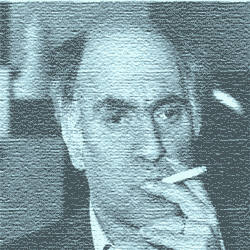
Mikhail Tal still enjoyed success after the World Championship
He went on two of the longest unbeaten runs in modern chess history. July 1972 to April 1973: 86 consecutive games unbeaten; 47 wins and 39 draws. October 1973 to October 1974: 95 consecutive games unbeaten; 46 wins and 49 draws.
His career and health began to suffer. He would not feature much in Classical competition now but would always right to the end remain very dangerous in blitz chess. He became World Blitz Champion in 1988. His final act of note was beating Garry Kasparov just a month before he died in 1992.
Tal Legacy
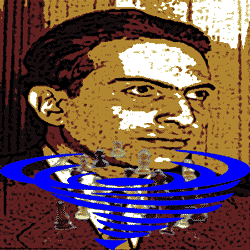
Mikhail Tal controlled the pieces as if by magic
Many of the positional giants that he was tormenting in his pomp disapproved of Tal's wrong way of playing. He was not like those who played the right way.
He was compared to Lasker who also played objectively inferior moves in the hope of provoking mistakes from his opponents. As Botvinnik said: he (Tal) was not interested in the objectivity of the position, whether it's better or worse, he only needed room for his pieces.
Tal said himself of the comparisons to Lasker, maybe half in jest: They compare me with Lasker, which is an exaggerated honor. Lasker made mistakes in every game and I only in every second one!
Tal's Approach to Life

In spite of his poor health, Mikhail Tal burned the candle at both ends
Misha was so ill-equipped for living... When he travelled to a tournament, he couldn't even pack his own suitcase... He didn't even know how to turn on the gas for cooking.
If I had a headache, and there happened to be no one home but him, he would fall into a panic: "How do I make a hot-water bottle?"
And when I got behind the wheel of a car, he would look at me as though I were a visitor from another planet. Of course, if he had made some effort, he could have learned all of this. But it was all boring to him. He just didn't need to.
A lot of people have said that if Tal had looked after his health, if he hadn't led such a dissolute life... and so forth. But with people like Tal, the idea of "if only" is just absurd. He wouldn't have been Tal then.
Moving On

Tigran Petrosian
If he could have had the iron will and durability of Botvinnik or Karpov along with remarkable trickery, he might well have been the first name to trip off the tongues of the uninitiated when asked about chess. He could have been a household name beyond the game he described as an art. But then, as many who knew him have said, he wouldn't be Tal.
As it was he was one of the two Winter Kings of the Botvinnik era. He would not be the one to bring that era to an end. That would be Tigran Petrosian.






